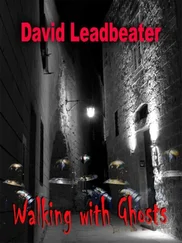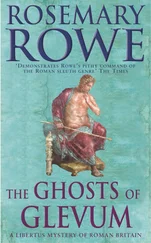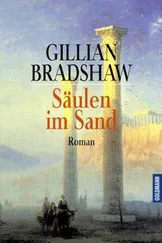Gillian Bradshaw - Island of Ghosts
Здесь есть возможность читать онлайн «Gillian Bradshaw - Island of Ghosts» весь текст электронной книги совершенно бесплатно (целиком полную версию без сокращений). В некоторых случаях можно слушать аудио, скачать через торрент в формате fb2 и присутствует краткое содержание. Жанр: Исторические приключения, на английском языке. Описание произведения, (предисловие) а так же отзывы посетителей доступны на портале библиотеки ЛибКат.
- Название:Island of Ghosts
- Автор:
- Жанр:
- Год:неизвестен
- ISBN:нет данных
- Рейтинг книги:3 / 5. Голосов: 1
-
Избранное:Добавить в избранное
- Отзывы:
-
Ваша оценка:
- 60
- 1
- 2
- 3
- 4
- 5
Island of Ghosts: краткое содержание, описание и аннотация
Предлагаем к чтению аннотацию, описание, краткое содержание или предисловие (зависит от того, что написал сам автор книги «Island of Ghosts»). Если вы не нашли необходимую информацию о книге — напишите в комментариях, мы постараемся отыскать её.
Island of Ghosts — читать онлайн бесплатно полную книгу (весь текст) целиком
Ниже представлен текст книги, разбитый по страницам. Система сохранения места последней прочитанной страницы, позволяет с удобством читать онлайн бесплатно книгу «Island of Ghosts», без необходимости каждый раз заново искать на чём Вы остановились. Поставьте закладку, и сможете в любой момент перейти на страницу, на которой закончили чтение.
Интервал:
Закладка:
Facilis looked bewildered. “What are you playing at, Ariantes?” he demanded.
“I am not playing at anything, Flavius Facilis.”
“Come on! I know you hate all Romans. What kind of game is this?”
“I am a servant of Rome,” I told him. “I accepted that servitude to buy my people’s freedom, and I could hardly go on living if I hated all Romans. Why should I wear out my heart? With any luck, you can go back to Pannonia in a few days, and I can go to my posting in Britain. I will not lie awake, regretting that you live. I intend to forget about you completely.”
All the journey, he’d gone red when he was angry. He had shouted and sworn and hurled insults. He’d spoken of Arshak’s hatred with relish. I hadn’t expected him even to pay attention to my declaration of indifference. But he went pale-or rather, yellow-gray, leaving the red in uneven blotches of broken veins across his cheeks-and he stared at me without saying a word. The pupils of his eyes contracted until he looked almost blind. I’d seen that look before, on the faces of men who’ve gone mad, in battle or grief. The crimson rages had been nothing: this was serious. I backed away.
“You killed my son,” said Facilis, in a choked voice. I stopped with my hand on the door. “You killed my only son and you intend to forget about me completely?”
He had his sword out. I didn’t dare move.
“Centurion!” cried the procurator. “Centurion! Put that weapon away!”
Until that moment I had never understood how powerful Roman discipline could be. Facilis stood rigid for a moment longer, fixed on me with that insane passion of rage-and then he began to shake. His head snapped away, and he fumbled the sword back into its sheath. “You stinking Sarmatian bastard,” he whispered. “It might have been you that did it. It might have been any of you.” He rubbed his face with one of his thick hands, and I saw that he was starting to cry. Coarse, cruel, miserable old man. I wanted, stupidly, to console him. But he was right: if his son had died in battle, it might have been me who did it. It might have been several thousand others, but it might have been me. So how could I console him?
“I am sorry, Facilis,” I said after a moment. “I also have dead to mourn.”
“You!” he exclaimed in disgust. “Sorry! Don’t make me sick! You bastards started that war.”
That was true, too, as far as it went. I turned to the procurator and said-quickly, so as to get out-“My lord, I will go tell my fellows that you are arranging for me to cross the ocean in the morning. Good health, my lord.”
And so the next morning I set out for Britain.
II
The sun was shining again, and the water sparkled in the light when I came down to the quay; on the sea’s plain, the waves curled whitely in the breeze. I smelled the sea for the first time then, salt and alien, and for all my bold offers, I was afraid. The procurator had arranged for me to travel in his dispatch vessel, a small bireme that carried letters and messages between the base in Bononia and one on the British coast opposite, a place called Dubris. It was a quick, light galley with one large sail and fifty oars arranged in two banks: it was shallow-decked, thin-skinned, and seemed to be held together only by a few bits of rope. When I stepped down into it I felt it shiver under my weight. The flimsy thing seemed to me quite certain to sink. But my fellows and all my men were watching me, so I waved to them, called “I’ll see you tomorrrow!” and tried to look confident as I searched for a place to sit. My leg wound had left me limping and clumsy, and I bumped into the rowing benches. The captain hurriedly ushered me to the back, out of the way, and arranged me beside the steersman. One of the sailors began to beat time on a small drum, the ship was loosed from the dock, the oars dipped into the water, and we slid out across the blue-green waters of the harbor. I clutched the ship’s side until my fingers ached, desperately praying that it wouldn’t sink.
It didn’t, of course. It was accustomed to make the voyage every few days, and the crossing was a matter of such routine that the sailors found my fears ludicrous. (I was seasick, and they found that funny, too.) They sealed up the lower oar-ports when we were well out to sea to keep out the waves, pulled up a corner of the sail to hold a straight line against the wind, and galloped cheerfully over the salt water in less than five hours. It was still early afternoon when I saw Britain for the first time: a row of cliffs, white above a blue sea, and beyond them, green hills; then the city of Dubris, with its lighthouse overlooking the deep harbor, and its streets climbing up the steep hill behind. The bireme brailed up its sail, let out the lower bank of oars again, and splashed up to the quay amid the shrieking of seagulls and the shouting of men.
I sat in the stern watching even after the vessel had been made fast. The oarsmen gathered their packs and strode off to their barracks in the naval base, their oars slung over their shoulders; the captain and drummer collected the sacks of dispatches and came aft to talk to me.
“Lord Valerius Natalis has offered you the use of his own residence in Dubris tonight, Lord Ariantes,” the captain told me. (It took me a moment to remember that Valerius Natalis was the procurator’s name.) “If you like, I can show you where it is and introduce you to his slaves. Or, if you prefer, we can meet here this evening, after I’ve delivered these.” He hefted the sack of letters.
“I will meet you here later,” I said. He was pleased to be rid of the burden of a clumsy oaf like me, and went off without another look.
I sat by myself for some time after he’d gone. The water lapped against the dock, and the ship rocked gently, like a wagon in a wind. It was extraordinarily quiet-no sound of men or horses, no clattering of harness or weapons. I could not remember when I had last been alone.
After a while, I picked myself up and stepped hesitantly onto the gangplank. I could see the shadow of it falling through the shallow water, making it dark, and a school of small fish nibbling at the stones of the quay. I limped very slowly down the plank, stepped onto the quay-and stopped. I had set foot on Britain, the island that was to be prison or home-and the action seemed almost too simple for such a consequential thing. Was this really the invisible island beyond the world’s end, the island of ghosts we all feared so?
After a moment, I walked on down the docks, out of the naval base surrounding the harbor, and into the town. It felt very odd to go on foot-my people are accustomed to ride everywhere-but somehow the simplicity of it was right.
Narrow houses overlooked the paved street, some of timber and stucco, a few of stone. A tavern sign shaped like a ship swung above the door of one; it had glass windows on its lower floor, wicker interlace shutters above. A man sold fish from wooden tubs outside his shop. Two women talked by a public fountain, one of them holding a baby. A girl carried a bucket of water, her tongue between her teeth as she tried not to spill it. I walked slowly, trying to take it all in. The cool clear afternoon light was the first light on a new world.
The street opened into a marketplace where the region’s farmers had set up stalls. I limped slowly through the bustle and the cries, looking. Some of the people there, the wealthier ones, wore Roman dress of tunic and cloak, but most were clothed in what I presumed was the native fashion. The men wore trousers and sleeved tunics that came to the middle of their thighs, and the women wore longer tunics and shawls. Most of their clothing was made of plain gray-brown wool, but they had a fondness for checked cloaks, which they pinned on both shoulders. They were, I thought, on average a bit shorter than my own people, and a bit darker-not so many blond and red heads, though plenty of blue eyes. Their faces were different, too-rounder, wider about the eyes, without the high cheeks and long thin bones. The more Romanized men were short-haired and clean-shaven, the native men long-haired and bearded, like me. They looked at me as curiously as I looked at them, and I could feel them staring after me, trying to work out where I came from. I was not wearing Roman dress, of course. I had trousers like their own men, but a shirt and sleeved coat instead of the tunic and cloak. I was wearing the coat with the sleeves loose, since the day was warm, but I’d pinned it on my right shoulder, the opposite way from them, and I had a leather hat with a peak, while they were all bareheaded. I was obviously a foreigner and a barbarian-but I was also obviously wealthy. My clothes might have been dirty, but they had been dyed expensively red, decorated with gold beadwork and fastened with gold, and my dagger had a jeweled hilt. I was a contradiction. It was not surprising that they stared.
Читать дальшеИнтервал:
Закладка:
Похожие книги на «Island of Ghosts»
Представляем Вашему вниманию похожие книги на «Island of Ghosts» списком для выбора. Мы отобрали схожую по названию и смыслу литературу в надежде предоставить читателям больше вариантов отыскать новые, интересные, ещё непрочитанные произведения.
Обсуждение, отзывы о книге «Island of Ghosts» и просто собственные мнения читателей. Оставьте ваши комментарии, напишите, что Вы думаете о произведении, его смысле или главных героях. Укажите что конкретно понравилось, а что нет, и почему Вы так считаете.












